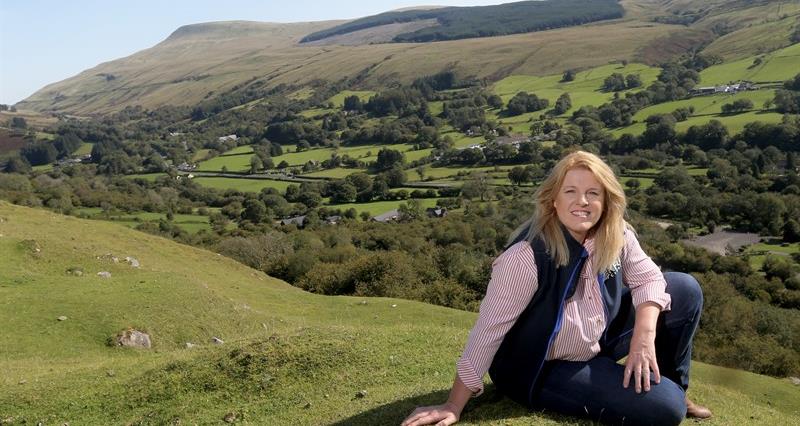A lightning strike killed her maternal grandfather not long after he had made the leap from tenant to landowner, leaving his widow with a six-year-old daughter, a dairy herd and a big mortgage.
To keep the business afloat, Kath’s grieving grandmother had to be resourceful, using her initiative to generate a secondary income by selling timber from beech trees that lined the farm lane.
She never remarried and relied on her daughter, Eileen, to help her on the farm at Pen-y-cae in the Swansea Valley.
“Mum became quite a resourceful woman who could turn her hand to anything,’’ Kath recalls. “There is a story that often gets retold at family occasions about how gran bought a milking pipeline in the 50s and mum got so fed up waiting for the man to fit it that she installed it herself.’’
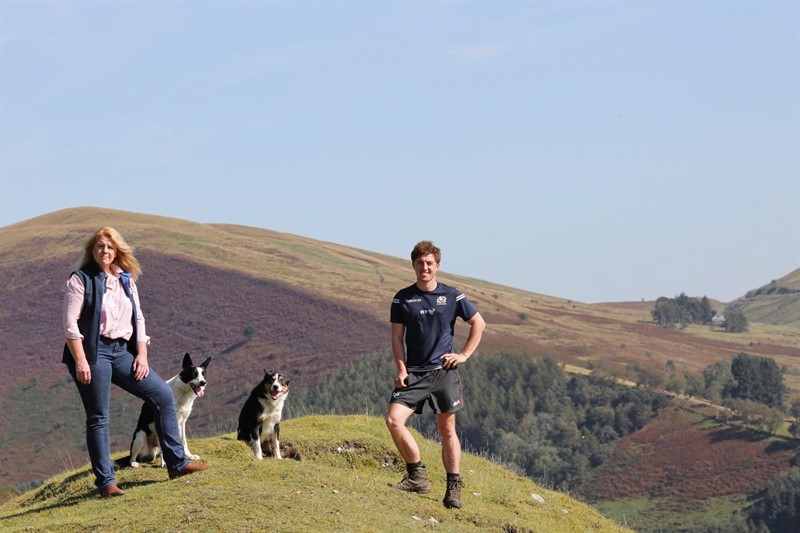
"Fortunately I am not a great lover of sleep."
Those strong-minded and hard-working women have been an inspiration to a woman who is also incredibly industrious, combining a full-time job at Barclays Agriculture with a demanding role on the family farm and chairing the NFU Cymru Less Favoured Area (LFA) Board.
How does she manage it all? “I have my mother’s genes and fortunately I am not a great lover of sleep.’’
Her mother, who trained to be a science teacher at Brecon High School, passed away 11 years ago after a long illness so Kath has always had a hands-on role on the farm with father and now her son, Alex, who manages Glynllech Uchaf and the hill land they graze on the Western section of the Great Forest.
The area farmed extends to 520 acres, half of which is tenanted, all LFA and rising from 400 to 1000 feet above sea level. At its highest point, the hill land rises to 1800 feet. The weather elements play a significant role, and grit and determination is needed to survive.
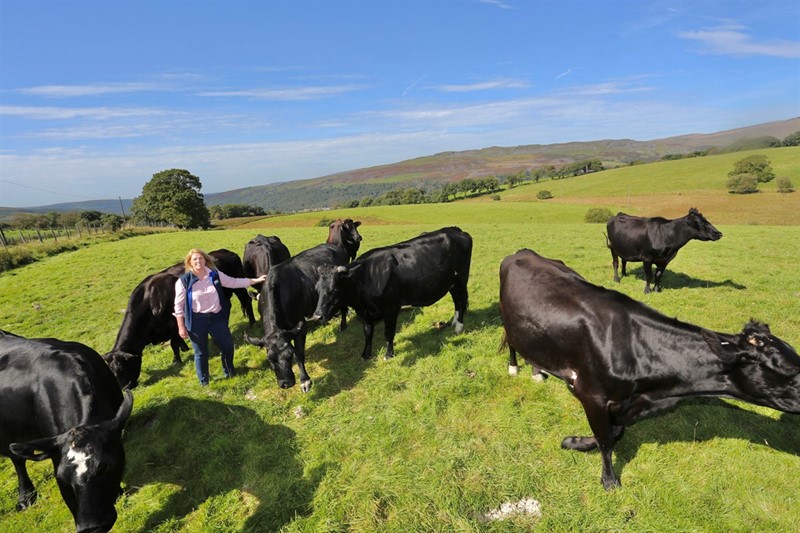
Alex, now aged 25, joined the business in 2014 having completed the first year of an agricultural engineering degree at Harper Adams University; due to changes in family circumstances at the time, he seized the opportunity to return to the family farm.
The hill flock is hefted and grazes the Great Forest
Kath says it’s important that the younger generation of farmers have strong skills, a good education and view farming as a career choice, a profession. “They are well rounded decision-makers and, having a profitable business where investments can be made, is vital.”
Of significant importance to the family is their hill flock which is hefted and grazes the Great Forest.
“We have had to revisit the breeding since turning back to the hill and now run a smaller, hardier ewe with a lower cost,’’ Kath explains.
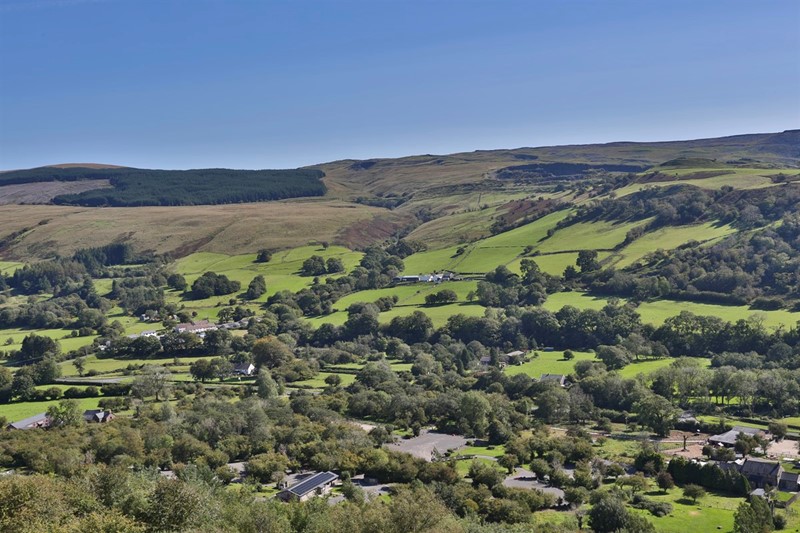
The closed hill flock consists of 750 White Face and Hardy Speckled ewes; 250 older ewes are tupped to an Innovis Aberfield ram and lamb indoors from mid-February, with lambing finished by mid-July. The Cheviot and Speckled rams lamb outdoors from mid-April. Stock is sold liveweight through Sennybridge Market.
Sinkholes and quarries make the common difficult land to graze and shepherd; this led to the family ceasing to graze it for a number years, until Alex returned to run the business.
“The hill is a young person’s game,’’ Kath admits.
“Re-hefting the sheep has taken a lot of hard work over the last four years with daily shepherding. The hill is four miles from the farm and, on a quad on a wet winter’s day, it’s no fun with the wind and rain in your face.’’
The ewes have now finally accepted the hill as their home.
The sheep share the grazing with a herd of 40 Aberdeen Angus x Limousin cows, served to a Limousin stock bull, with half the herd calving in the spring and the remainder in the autumn. This allows best use to be made of the poorer quality grazing areas of the holding.
The mixed livestock system suits the business well
Heifers are sold at 9-10 months through local livestock markets, with young bulls finished at between 12-16 months.
Kath says a mixed livestock system suits the business well. “We can manage cash flow better with two enterprises.’’
There are many challenges that come with farming - no matter where the farmed area is, she believes. “The quality of land we farm and high rainfall - over two metres annually - do restrict options.’’
The land is heavy soil and peat over clay and the winter is long, with cattle housed for up to seven months; this puts pressure on financial control amid rising feed and bedding costs.
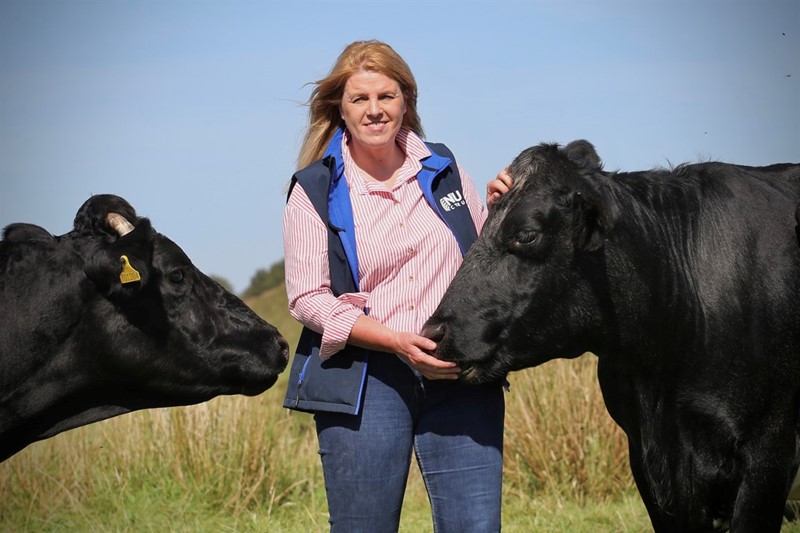
The financial resilience of businesses like theirs is more important now than ever, with changes to farm support and the unknowns of Brexit.
“We have got to manage our costs well, question if an investment is viable, is the time right for it, is it the right thing to do,’’ says Kath.
“In our case, we run a low cost system, with ewes that are easy to manage, and getting lambs away as early as possible with the resources we have.’’
Yet, when Kath assesses what the farm generates from an efficient system and the level of commitment and investment required to meet regulation and environmental responsibilities, the future is uncertain.
Although nowadays Alex has the final say on decisions on the future direction of the business, it’s still very much a family operation. This gives an opportunity to discuss and reflect as well as provide support to each other in those business decisions.
Kath has been promoted to the position of ‘gofer’ while her father, Charlie Millward, is an important sounding board for advice and his deep knowledge of the farm and its idiosyncrasies.
Many farms have already explored diversification opportunities to reduce reliance on specific sectors.
Large scale renewable energy opportunities that have been the route for many are not an option for Kath and her family as they farm within the Brecon Beacons National Park.
"The Beacons is a beautiful place to live and work"
“The National Park Authority has a role to play, something has to be compromised and it is not going to be the landscape, which I appreciate,’’ she concedes.
“The Beacons is a beautiful place to live and work and we want to thrive for the benefit of everyone, our wonderful environment, the deep-rooted culture and, of course, the rural economy.’’
Opportunities could lie in the tourism sector but that requires a different skillset from farming, Kath maintains. “Farmers want to get on and get things done with the land or stock, time is always a precious commodity, and that can be at odds with the demands of a hospitality business where guests need meeting and greeting!’’ she laughs.
For now, the family will concentrate on ensuring they get the best possible return from the farm.
There is always work to be done - reseeding, fencing and sheds - but the livestock enterprises need to generate a return to pay for that; the family always considers return on investment and the enterprises have to be profitable.
The farm is in Glastir Advanced, where food production and environmental practice exist side by side. Over 40 acres is designated as a Site of Special Scientific Interest (SSSI) .
The phasing out of direct support is a worry, not just for farmers but for rural communities, says Kath.
“Farmers generally spend their returns on improving and investing in the running their businesses and mostly do that within a 30-mile radius of their farm which brings economic as well as social and cultural benefits to those communities.’’
Kath suggests farmers will need to adapt. “The whole world is going through huge financial change. Our consumers deserve to know where their food comes from and that it has been raised to the highest standard.
“But regulation bears a cost and a cheap food policy would be a dangerous route to take. We have to be able to compete. A race to the bottom would be detrimental to everything we have achieved in getting world renowned Welsh beef and lamb produced in a wonderful environment.’’
But, she adds: “The last thing we as a nation want to do is to lose our ability to produce food, we would really be over a barrel then.’’
